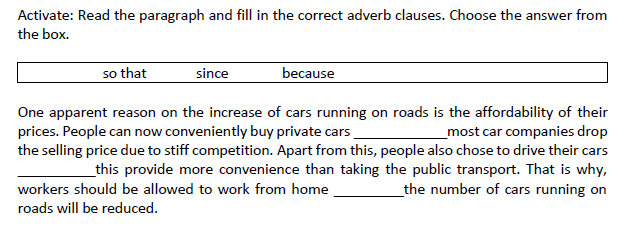IELTS Writing Task 2 Basic
Adverbial Clauses: Reason and Purpose Clauses

IELTSのライティングTask 2の採点基準「Grammatical Range and Accuracy
文法の幅と正確さ(25%)」で高い評価を得るために、エッセイの文章構成は単文だけでなく、
複文(complex sentences)を使うことが必要です。
節(Clause)の種類
節とは、S + V の関係を持つもので「文の中の文」とも言えます。節には文全体の主語とその述語動詞から成り立つ 主節 と、それに従属的な働きをする 従属節 があります。従属節は 名詞節・形容詞節・副詞節 の 3つに分類されたます。
文中の名詞以外の語句(主に動詞や主節全体)を修飾する節を副詞節と呼びます。
今回は理由・原因と目的の副詞節 (Adverbial Clauses: Reason and Purpose Clauses)
で複文を書くことを学んでいきます。
<原因や理由を表す>

● because
becauseは、理由・原因を表わすのに最もよく用いられます。becauseで導かれる副詞節は、たいてい主節の後に置かれます。
I didn’t tell my father because I was afraid of being punished.
父にはそれを話しませんでした。罰を受けるのが怖かったからです。
Why did you choose those shoes? – (I choose them) Because I liked the color.
どうしてあの靴にしたの? - 色が気に入ったから。
● since
sinceは、主に相手が知っている理由・原因を表わし、通常は主節の前で用いる。
Since I was thirsty, I drank water.
のどが渇いたので、水を飲んだ。

Since it’s cold outside, you’d better put your overcoat on.
( 外は寒いからオーバーを着た方がいい。 )
● as
as は since よりも意味合いは弱く、話し手・聞き手とも既に事実として知られている原因や理由を表します。 as には他にも多くの意味があるため、原因や理由を述べる場合には基本的に because や since が用いられます。
As I am busy, I cannot go.
忙しいのでいけない。
As you are sorry, I’ll forgive you this one time.
あなたは反省しているので、今回だけ許してあげます。
<目的を表す>
● so that 「 ~ するために 」「 ~ となるように 」
口語では that が省略されることが多い。この用法の that 節には一般的に can, could, will, would may, might, should が助動詞として用いられます。
We eat so that we can live.
私たちは生きるために食べる。

I spoke so slowly so that the children might understand me.
子供達が私の言うことを理解できるようにゆっくり話した。
● in order that 「 ~ する目的で 」
文語的表現で、口語では so that を用います。また、この用法の that 節にも can, could, will, would may, might, should が助動詞として用いられます。
I came early in order that I could get a good seat.
良い席が取れるように早く来た。
He did everything in order that he could get the prize.
彼はその賞をとられるように何でもやった。
Study: 試験で使える!例文 理由・原因と目的の副詞節

1. The problems on road congestion remains a matter of concern because some people are not cooperating with the government.
2. Since the government cut spending, poverty has increased.
3. Pollution is increasing as there are too many cars. (check the SVA – subject-verb agreement)
4. The government is encouraging people to take the public transportation in order to lessen the amount of road congestion on major roads.
5. Work from home must be permitted so that work attrition among workers will be reduced.








